Crop yield drop, firewood scarcity, extreme heat and rain are spurring anxiety and depression, finds non-profit working on unique pilot that has thrown open a modern counselling centre to 4,000 residents in Pune district
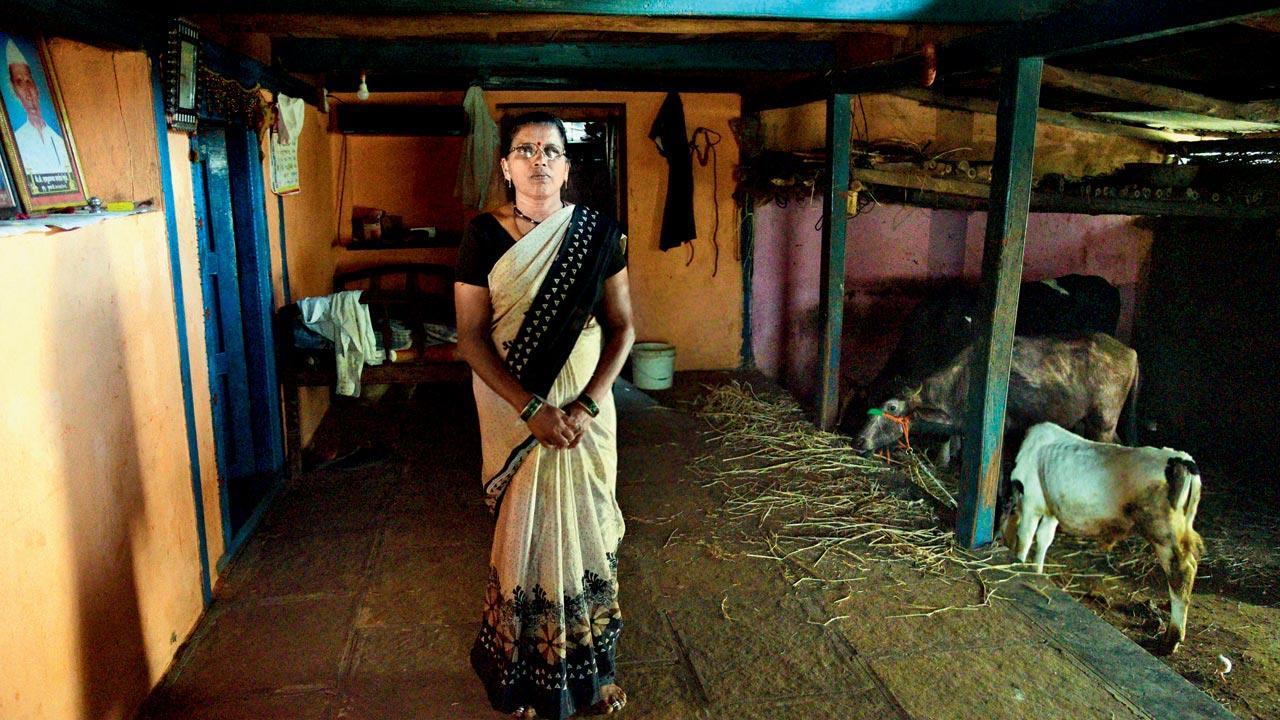
Manda Arjun Renuse is an ASHA worker and resident of Sakhar village in Velhe taluka of Pune district, Maharashtra. She says over the last five months, the free counselling centre set up by Raintree Foundation has become a safe space for women to talk with trained counsellors when they are having a rough day. Pic/Pradeep Dhivar
While Mumbai’s April summer has been ruthless, 210 km away, in the Velhe taluka of Pune district, it is capricious. Burning at 38 degrees Celsius when we arrive on a weekday afternoon, the land looks dead-beat—charred yellow and green. Fifteen hours ago, the taluka was drenched following an unseasonal shower. Tiny puddles on the roadside, now on the verge of drying up, are proof of the previous evening’s downpour. The winding road leading to Rajgad Fort, a 17th century Maratha pride crowning the Sahyadris, breaks at Sakhar village, where our Google Maps stops. Up on a tiny mound, an off-white pakka structure stands like a recluse. Drawing little attention, and hidden by sweeping branches of the trees that line its perimeter, it has become the centre of a slow reform in Velhe.
ADVERTISEMENT
On November 23 last year, Pune-based non-profit Raintree Foundation set up the Manosaarthi Counselling Centre here. With two counsellors visiting once a week each, on Tuesdays and Saturdays respectively from 9 am to 5 pm, the centre has been catering to a rather reluctant population’s distress and support needs. In the last five months, it has seen 25 villagers, and conducted 89 follow-ups. When we visit, a counselling session is underway. A villager had arrived there an hour earlier, slipping inside the counselling room from a rear entrance. An NGO staff member tells us that this is done to maintain anonymity. “It has taken us a great deal to convince them to come here... we want to respect their privacy.”
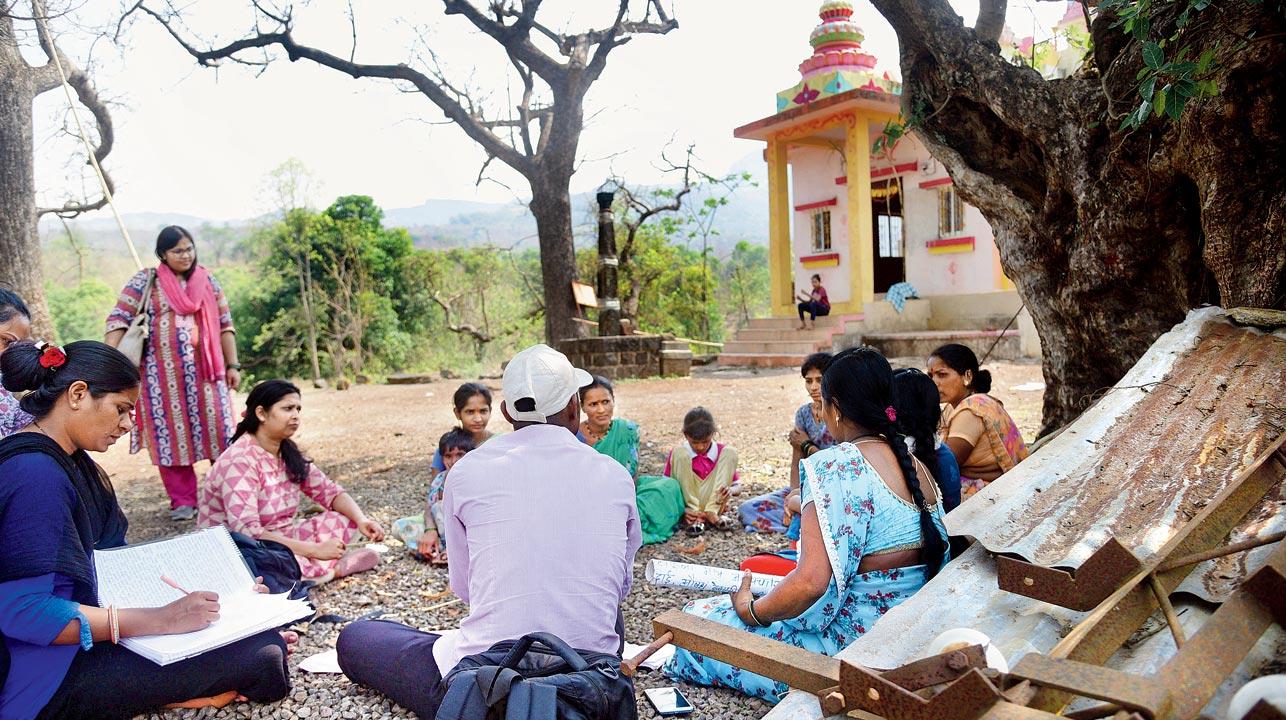 Community resource persons, all members from within Velhe taluka, seen conducting a gender and mental health session near a temple in Merawane. The women were advised to create a more equal space at home, ensuring chores are distributed between their sons and daughters
Community resource persons, all members from within Velhe taluka, seen conducting a gender and mental health session near a temple in Merawane. The women were advised to create a more equal space at home, ensuring chores are distributed between their sons and daughters
When the organisation arrived in Velhe in 2018, it was with the intention of running a nine-year pilot to make the people of this region “resilient to fight climate change, from an environmental, economic and emotional perspective”, says Namita Dandekar, chief operations officer. The taluka wasn’t shortlisted overnight. The NGO undertook multiple explorations to villages in and around Pune, before they landed in Velhe, surrounded by a horseshoe-shaped ring of mountains. With a population of 4,000 people, spread across nine villages and occupying over 2,100 hectares of land, of which 200-odd hectares was precious forest land, Velhe provided a compelling case for their cause.
“We observed that despite it being so close to Pune [a distance of around 50 km], it had very poor human development indicators.” The Human Development Index (HDI), according to the United Nations Development Programme, is a summary measure of average achievement in key dimensions of human development: a long and healthy life, being knowledgeable and having a decent standard of living. “For a long time now, Velhe has also been witnessing extreme weather conditions,” says Dandekar, “During the monsoon, the region sees very high rainfall. But in the summer, it has terrible drought-like conditions. Soil degradation has also been a worry.” With just a few primary income sources for the villagers, including paddy, poultry and dairy farming, most of the male members have been forced to migrate to the cities—Pune being most favoured, followed by Mumbai—to work as daily-wage labourers. After a round of discussions with heads of local government bodies and signing an MoU, Raintree set up base here, focusing on a slew of sustainable landscape management initiatives, including water and food security programmes, solid waste management, improving energy security and working on environment conservation. Only recently, 17 farmers from nine villages participated in a farm pond project, which involves constructing a small reservoir to store water from rain that flows over the land surface. The project was aimed to provide access to water for paddy cultivation during the leaner summer months. They have also introduced pond-based livelihoods, such as fruit and vegetable cultivation. Farmers have set up orchards of mango, guava, jamun, and have also begun experimenting with growing cluster beans, okra, tomato and brinjal.
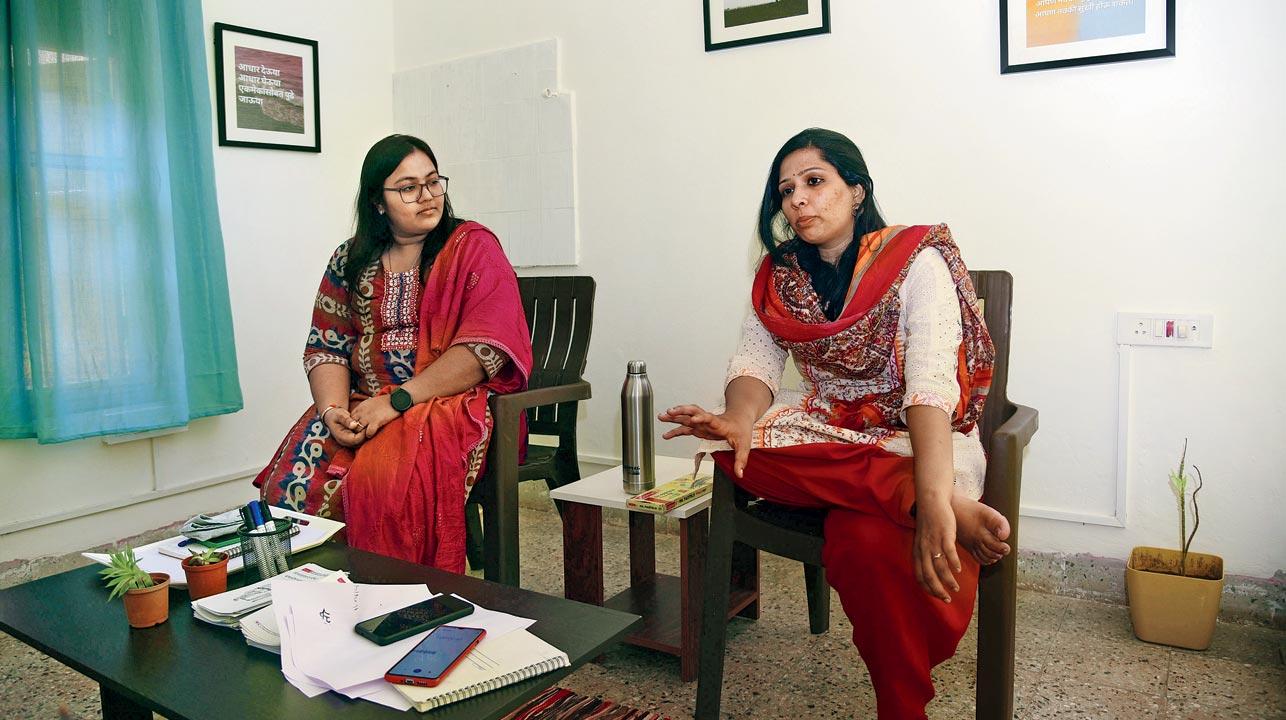 Minal Karani, senior programme associate at Raintree Foundation, and counsellor Juilee Bapat at the counselling centre inside the NGO’s office in Sakhar. Pics/Pradeep Dhivar
Minal Karani, senior programme associate at Raintree Foundation, and counsellor Juilee Bapat at the counselling centre inside the NGO’s office in Sakhar. Pics/Pradeep Dhivar
It’s during the many focussed group discussions and door-to-door data collection, says Dandekar, that the foundation realised the pernicious effects of climate change on the mental health of villagers. She cites a quotidian problem—procuring firewood for cooking. “A lot of women in Velhe didn’t have access to cooking fuel, so they’d visit the forest to procure firewood. Some years ago, the government provided them with cooking gas [LPG cylinders]. But to refill these, the women had to go to Nasrapur [45-minute drive away].” This along with the rising prices of LPG were a deterrent for many. Many went back to using firewood. But firewood was impacting their health—smoke from burning wood is known to cause coughing, wheezing, asthma attacks, heart attacks, and premature death—and depleting environmental resources. A family was cutting an average of 10 trees a year to cook. There was an added stressor of how to procure the firewood, considering most of the area was protected by the forest department. “How, where and when they would get access to firewood had become stress-inducing [for many women].” One of the interventions the non-profit helmed was introducing biodigesters—a system that utilises organic waste, particularly animal and human excreta, to produce fertiliser and biogas—inside homes.
Homes where cows and buffaloes were being reared ensured a steady supply of organic waste. This is where the biodigesters were initially installed. A one to two-foot-deep pit was dug in which the tank was installed. Apart from producing biogas, the slurry that emerged, could be used as organic fertiliser.
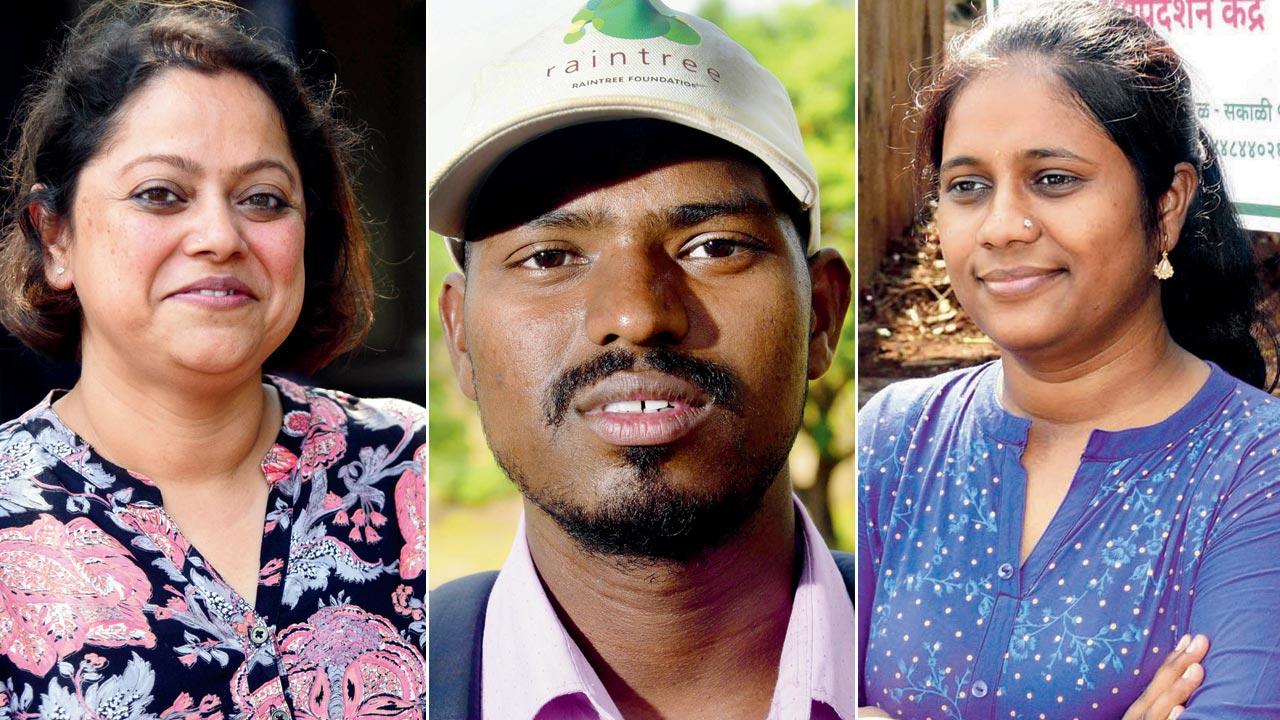 Namita Dandekar, Sunil Pawar and Ankita Prabhakar Tumsare
Namita Dandekar, Sunil Pawar and Ankita Prabhakar Tumsare
Currently, around 60 families have biodigesters in their homes. “It has given them a clean source of fuel for cooking. But, it has also freed up a lot of time for the women... time that was otherwise spent on going into the woods, cutting, and hauling wood back. This has reduced a lot of the stress at home.”
Fall in agricultural produce has seen the farmers complain about how the mango trees that once gave 800 fruit, now barely give 200. “It’s the same tree, same processes, but the yield is at all-time low. This ultimately takes a toll on their mental health,” Dandekar adds.
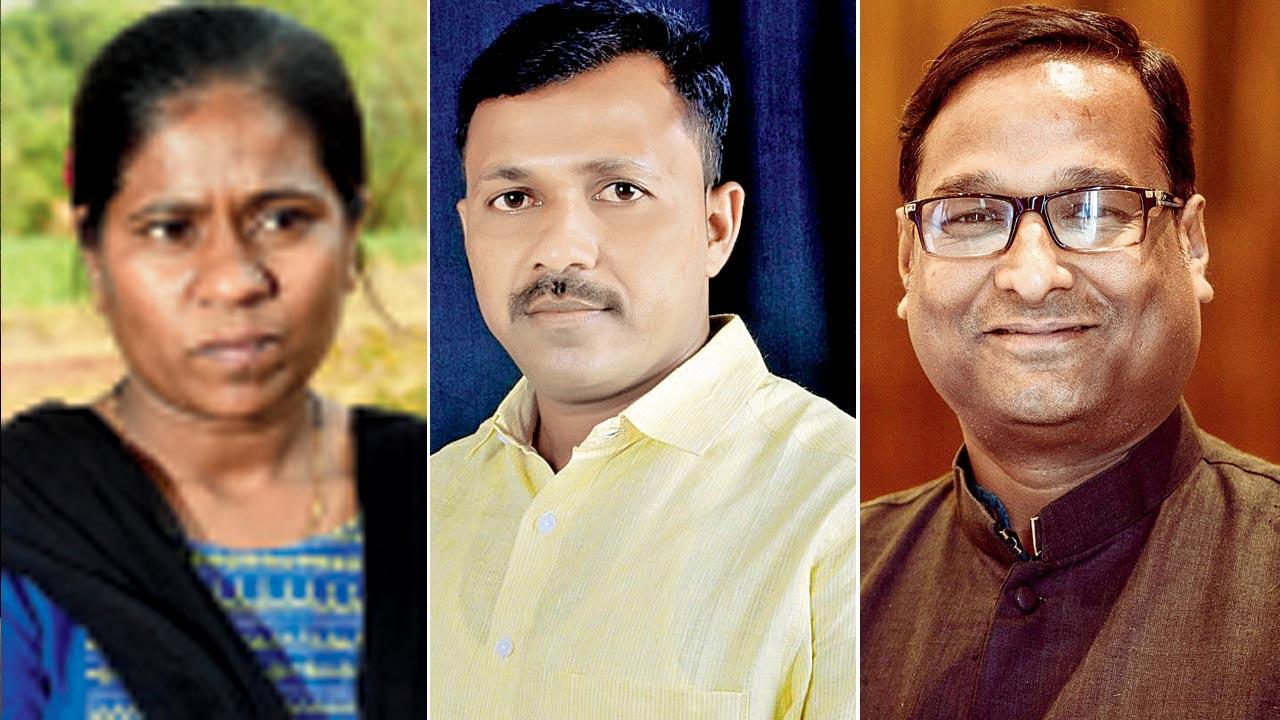 Naseema Shaikh, Anant Maruti Renuse and Dr Anjal Prakash
Naseema Shaikh, Anant Maruti Renuse and Dr Anjal Prakash
During the pandemic-induced lockdowns, when the NGO was barely a year-and-half old, a 24/7 helpline was launched for the residents. Minal Karani, senior programme associate at Raintree, says that they started by making calls to individual villagers to check up on them. Over a period of four months, they reached out to 360-plus people. Data revealed that domestic violence was a big concern. Many of the migrant workers were back home. Job uncertainty and poor crop yield was driving them over the edge. Addiction and abuse was common. “And women were the victims,” says Karani.
Baseline data gathered from each household using WHO’s self-reporting questionnaire revealed that 34 per cent of the population in these nine villages required psychosocial support. “Suicide is a hush-hush topic here, but it was something they were struggling with. A lot of the cases were going unreported. Our field team workers highlighted how many were on the brink of falling apart.”
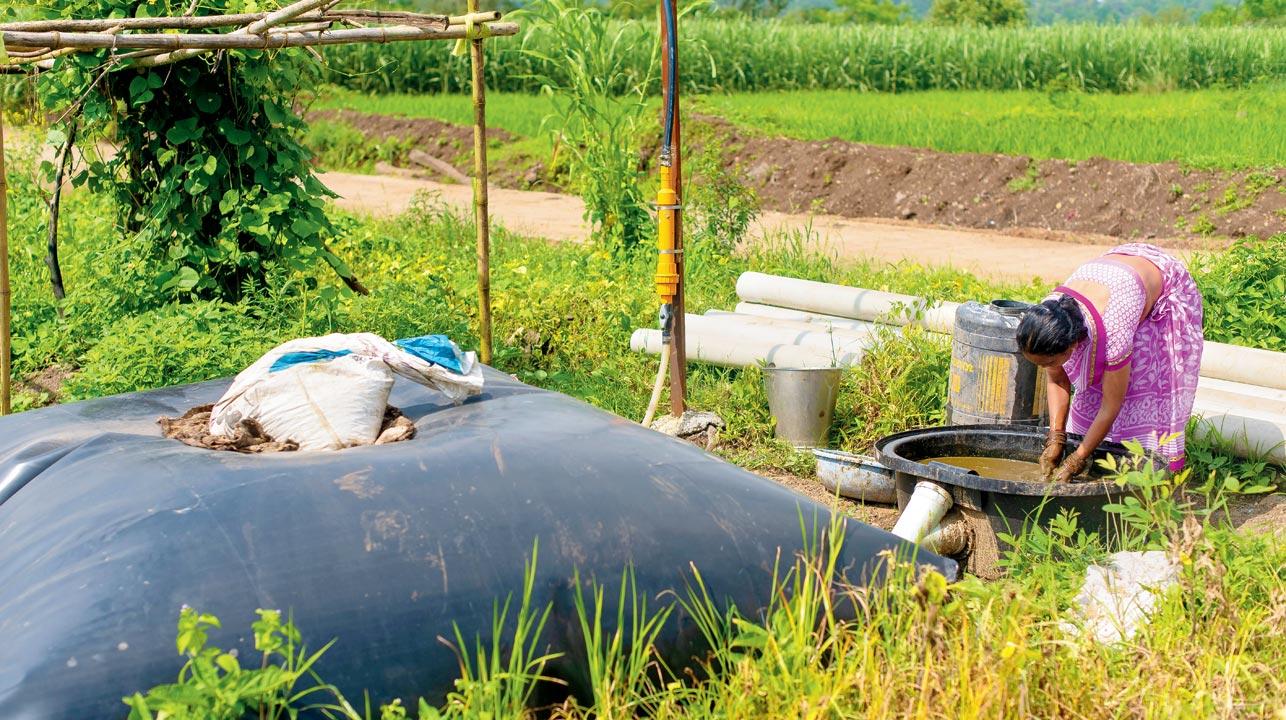 To reduce the reliance on firewood for cooking, Raintree Foundation installed biodigesters—a system that utilises organic waste, particularly animal and human excreta, to produce fertiliser and biogas—inside homes in villages of Velhe taluka. Currently, around 60 families use these biodigesters
To reduce the reliance on firewood for cooking, Raintree Foundation installed biodigesters—a system that utilises organic waste, particularly animal and human excreta, to produce fertiliser and biogas—inside homes in villages of Velhe taluka. Currently, around 60 families use these biodigesters
While members from within the villages—community resource persons—were being trained by Pune-based Bapu Trust to work as para-counsellors, the foundation decided to open the counselling centre to address the looming problem.
“Villagers don’t have a vocabulary for mental health,” says Juilee Bapat, a counsellor, who comes to Sakhar once a week from Pune. “They don’t use words like anxiety, depression or stress. They’ll instead say, they feel like ending their life, or ‘mala chidh chidh hote’ [I am feeling irritable], that they don’t have anyone to speak with.” Some of their conditions are also psychosomatic—body pain, headache, lethargy—for which they would take over-the-counter medicines. “They don’t see these problems as mental health issues. The language they use is different because their socio-cultural circumstances are not the same [as urban dwellers].”
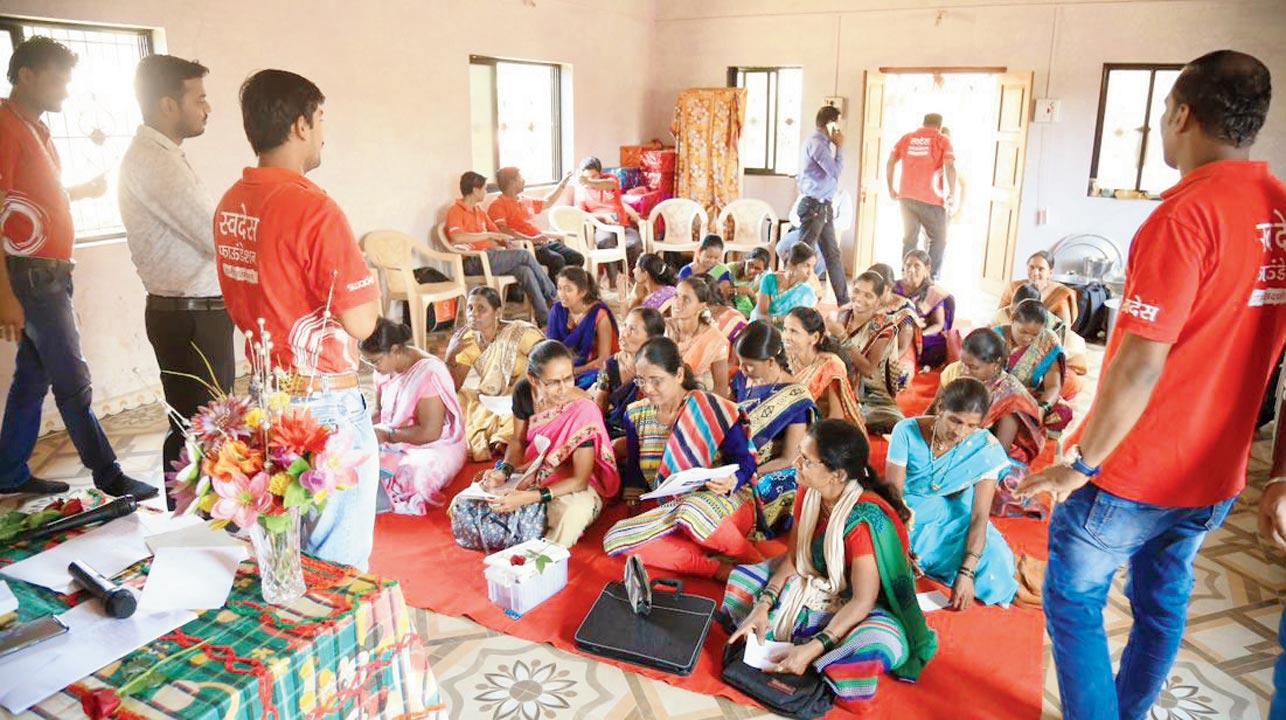 A health workshop helmed by Swades Foundation underway at a village in Maharashtra. In 2019-20, the NGO roped in 446 adolescents (from Class VIII to Class X students) to participate in a mental health awareness session led by MPower Foundation
A health workshop helmed by Swades Foundation underway at a village in Maharashtra. In 2019-20, the NGO roped in 446 adolescents (from Class VIII to Class X students) to participate in a mental health awareness session led by MPower Foundation
Their triggers are different too, and most often related to livelihood: drop in the milk yield of a cow or unseasonal rain which affects paddy.
The volunteers alongside fought the stigma around conversations related to mental health. “In villages, mansik arogya [mental health] is synonymous with being ‘mentally ill’. It’s why we have called our centre a ‘manosaarthi kendra’ [a centre to guide you with how you feel],” says Bapat. Karani adds, “When we speak to the villagers, we tell them we are here to discuss ‘manachi kalji’ [care and wellbeing of the mind].”
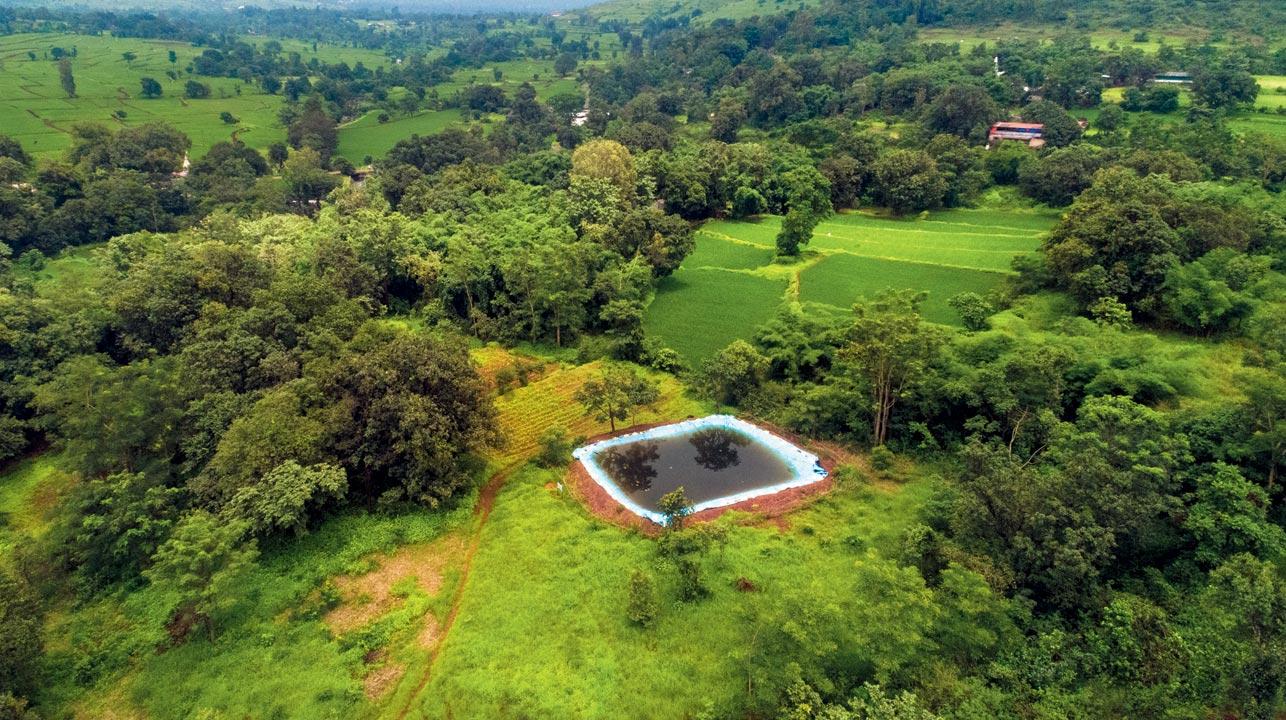 Raintree Foundation is leading a farm pond project in Velhe, which involves constructing small reservoirs. The project is aimed at providing access to water for paddy cultivation during the leaner summer months. Velhe taluka sees very high rainfall during the monsoon, but experiences drought-like conditions in the summer
Raintree Foundation is leading a farm pond project in Velhe, which involves constructing small reservoirs. The project is aimed at providing access to water for paddy cultivation during the leaner summer months. Velhe taluka sees very high rainfall during the monsoon, but experiences drought-like conditions in the summer
But the bigger challenge was getting them to the centre in the first place. Community resource persons (CRP) were roped in to lead awareness programmes. “We broke mental health into smaller modules—anger, nutrition, disability, gender-based violence, inclusion, fear, addiction, environment, among others. At the sessions, we address these issues through songs, movie screenings, street plays, games or chalta-bolta [randomly speak to a scattered group of people]. Highlighting these issues has helped villagers relate to their problems better,” says Karani. “We were clear—we wanted to give them a space to talk through their troubles, and together, help them find a solution,” says Bapat.
While sessions at the centre are free, the common excuse given by villagers is that it was too far away from their homes. “Women especially, found it difficult to leave household duties and spare an hour,” says Bapat, “But most of the excuses were related to stigma.”
Things are slowly changing. “Now, some women time their visit [to the centre] with bus arrivals. Taking ownership [for self-care] is also a journey,” explains Bapat.
An 82-year-old, says Bapat, walked almost an hour from his home to visit the centre in Sakhar. “He wanted to talk about his wife. Unfortunately, he had a hearing impairment and it was difficult to engage with him.”
There’s also the story of a middle-aged man, who lost his wife to a heart attack, and came to the centre desperate. “The wife’s family and neighbours claimed that an alleged affair between him and another woman had driven his wife to death. By blaming him for her sudden death, they were trying to process their own grief, but it had a huge impact on his mental health,” says Bapat. “When he arrived, he told us, ‘If I hadn’t come here today, I would have killed myself’.” The man, she says, is now on the road to recovery. “He has also started going to work.”
Poor money management and inability to pay back loans are other common reasons for farmers being pushed to the edge. Ankita Prabhakar Tumsare, who is a field officer, helps those with disabilities—there are 129 people with physical, and intellectual disabilities in the taluka—articulate how their challenges with inclusion can impact their mental health.
Dr Anjal Prakash, Intergovernmental Panel on Climate Change author, and associate professor (research) and research director of Bharti Institute of Public Policy, Indian School of Business, feels that mental health in agrarian communities is likely to become an increasingly important issue in the coming years, particularly in Vidarbha and Marathwada, where drought and climate-related stresses have devastatingly impacted farming communities.
“One of the most visible effects of climate change in rural Maharashtra is the decline in rainfall. This has led to a decrease in water availability for farming, leading to a decline in agricultural productivity. Farmers have been forced to rely on groundwater, which is often expensive and unsustainable, leading to a depletion of the water table. In addition, the rising temperature has led to increased pest attacks, making it difficult for farmers to grow crops.”
A 2021 study titled Future Climate Change Scenario over Maharashtra, Western India: Implications of the Regional Climate Model (REMO-2009) for the Understanding of Agricultural Vulnerability was published in the peer-reviewed scientific journal, Springer Nature. It highlighted how rising temperatures and extreme weather events would adversely affect the state’s agricultural output after the year 2033. According to the study, around 80 per cent of Maharashtra’s districts are expected to witness a rise in annual mean temperature (AMT) between 2033 and 2050. This, in turn, will affect water security and agro-climatic conditions, leading to diminished yields of sugarcane, jowar, pearl millet, rice and wheat, among others.
The farmers are already being impacted, says Prakash. Of the 1,39,123 suicides recorded in the country in 2019 (as per the National Crime Records Bureau, 2020), Maharashtra accounted for 13.6 per cent of the caseload, which is the highest in the country. The highest number of suicides occurred among cash crop growers, specifically cotton farmers. A study conducted in Yavatmal district in Maharashtra found that 55 per cent of the surveyed farmers suffered from anxiety and 24.7 per cent suffered from insomnia.
Social Policy Research Foundation (SPRF), a think-tank working to bridge the gap between public policy and academic research, reported how farmer suicides also construct a “second tragedy of altruistic suicides among farmers’ children”. “...children are forced to step into their parents’ shoes. Anecdotal evidence finds that older male children of the family find themselves shouldering several responsibilities such as repaying unpaid debt, funding the education of younger siblings, and facilitating the marriage of younger sisters. Usually, the only way to achieve this is to drop out of school, work in the fields to earn money and aid the other elder family members, typically mothers. Baccha kisans or child farmers are now common in Marathwada and Vidarbha regions,” SPRF reported.
NGOs like Swades Foundation, which has been working with over 2,500 village hamlets in Maharashtra for the last two decades, has been taking baby steps to create mental health awareness among adolescents. In 2019-20, it roped in 446 adolescents (from Class VIII to Class X students) to participate in a mental health awareness session led by Mpower Foundation. Around 51 teachers were also trained. “Lack of awareness and stigma are both a problem. Among adolescent girls and boys, there is growing competition, pressure and desire that affects the mental wellbeing of the youth. They are subjected to peer pressure, academic pressure and pressure of marriage,” shares Mangesh Wange, CEO, Swades Foundation.
Back in 1982, the Government of India had launched the National Mental Health Programme (NMHP) to “ensure availability and accessibility of minimum mental healthcare for all in the foreseeable future, particularly to the most vulnerable and underprivileged sections of the population”. Fourteen years later, a District Mental Health Programme (DMHP) was launched under NMHP to decentralise mental health services. While DMHP was considered highly successful in providing mental healthcare to the community at least at the district level, and the Centers of Excellence that were set up to strengthen PG training departments of mental health specialties, were also efforts in the right direction, the benefits are yet to percolate to rural areas like Velhe. “The rigours and structures adopted by the government are great, but it’s a process, and it takes time to reach everyone,” says Namita Dandekar of Raintree, “We are doing what we have to do. It’s not in any way in competition with their [the government’s] work. Our effort is to sensitise everyone in the community, and I hope our contribution helps the government in its future programmes.”
Prakash believes that a multi-faceted approach is what is needed. This includes improving rural infrastructure, providing financial support to farmers, and promoting a climate-resilient agriculture, along with mental health interventions. It’s this 360-degree model approach that Raintree Foundation has adopted in its goal to make villages of Velhe climate-resilient. The NGO is exploring a new agrarian landscape within Maharashtra to implement a similar project in the future.
Prakash feels that the role of his community is going to be crucial in the near future. “Climate scientists can help by studying the relationship between climate change and mental health in rural communities and developing strategies to help farmers cope with the psychological stress caused by natural disasters. However, there needs to be more academic work on this and attribution, and contribution to climate change are hard to establish. We need more scientific work on this subject.” What we need is a collaborative effort between climate scientists, policymakers, and government departments, he feels.
The day we visited, CRPs were leading a gender and mental health session near a temple in Merawane, a village 10 minutes from Sakhar. A tiny group of women have gathered, some with their children. “Do you treat your daughters and sons equally?” one of the CRPs asks. The conversation veers to how they can empower their daughters by giving them an education, motivate them to take jobs, and how they should encourage their sons to do small chores at home and not hold their emotions back. “Men can cry too.” Creating a more equal space at home, they suggest, will ensure that women are treated with dignity; it will also bring down cases of violence.
Sunil Popat Pawar, a resident of Gunjawane, who is leading the session, says that mental health is a new concept for villagers. “Especially for women, many of whom are not educated. They don’t know why they feel angry, sad or tired,” says Pawar, who has been working with the foundation for seven months. “We treat the issue with care and sensitivity... we want to encourage them to share their concerns with us, as honestly as possible.” According to Pawar, men are still hesitant to speak. There are villagers like Naseema Shabhir Shaikh, a housewife, who didn’t see any value in the mental health awareness drive, until she became a CRP herself. “Mobilisation [in the villages] took a lot of time. I have been working here for the last two years. I remember [earlier], when we would visit homes, they would drive us away, asking us not to waste their time. But after the counselling centre opened, things have started to change.”
ASHA worker Manda Arjun Renuse who was to attend a mental health training session later in the week, says now women feel like they have a safe space to go to. “Because of my work, I was aware of the problems they were facing; they would confide in us. Now, when they feel anxious, they go directly to the counselling centre,” she smiles.
Anant Maruti Renuse, sarpanch of Lavhi village echoes her sentiments. “In cities, we see fitness centres employ mental health doctors. But here, mental health is a taboo topic. Individuals are engrossed in meeting basic necessities. But I have noticed that Raintree’s initiative may be working at empowering the villagers emotionally.”
Also Read: Tiger-human conflict: Why are man-animal conflicts on the rise in India?
80
Percentage of state’s districts expected to see rise in annual mean temperature between 2033-2050. This will affect water security and agro-climatic conditions, leading to diminished yields of sugarcane, jowar, pearl millet, rice and wheat
55 per cent
Farmers surveyed during a study conducted in Yavatmal district of Maharashtra who were found to suffer from anxiety; 24.7 per cent suffered from insomnia
 Subscribe today by clicking the link and stay updated with the latest news!" Click here!
Subscribe today by clicking the link and stay updated with the latest news!" Click here!







